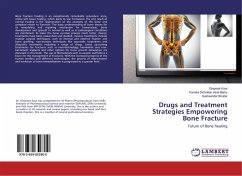
Plasticity based strategies for the treatment of depression
Versandkostenfrei!
Versandfertig in 6-10 Tagen
40,99 €
inkl. MwSt.

PAYBACK Punkte
20 °P sammeln!
Major depression is classified today as a leading cause of disability-adjusted life years. Since late 50s with the serendipitous discovery of the first antidepressant agents, pathophysiology and therapeutics of depression are governed by the monoaminergic hypothesis. Recent research has unveiled an array of new mechanisms through which antidepressant medication helps restore neuronal plasticity and neurotransmission that is disrupted in mood disorders and in animal models of depression. Glutamatergic transmission and signal transduction cascades have been implicated both in antidepressant acti...
Major depression is classified today as a leading cause of disability-adjusted life years. Since late 50s with the serendipitous discovery of the first antidepressant agents, pathophysiology and therapeutics of depression are governed by the monoaminergic hypothesis. Recent research has unveiled an array of new mechanisms through which antidepressant medication helps restore neuronal plasticity and neurotransmission that is disrupted in mood disorders and in animal models of depression. Glutamatergic transmission and signal transduction cascades have been implicated both in antidepressant action and the pathophysiology of depression, as here and now regulators that mediate persistent changes. In this study, AMPA receptors positive modulators demonstrated antidepressant-like effects and a rapid onset of antidepressant action. The ERK/MAPK signaling pathway was also studied as a major integrator of synaptic plasticity modifications that links extracellular signals to gene expression regulation via its downstream molecular partners. Overall, the findings of this work reveal novel, promising targets for the treatment of depression.












